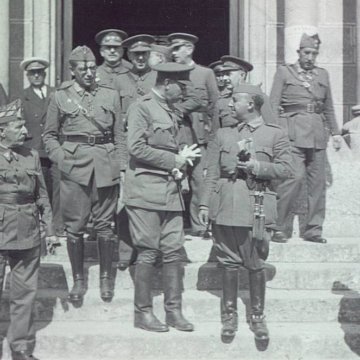- About
- Topics
- Picks
- Audio
- Story
- In-Depth
- Opinion
- News
- Donate
- Signup for our newsletterOur Editors' Best Picks.Send
Read, Debate: Engage.
Located roughly 60 kilometres from Madrid, the colossal Valley of the Fallen continues to prominently display the grave of the former Spanish dictator, Francisco Franco, despite the country´s previous 40 years of democracy. Encompassed by a 150-metre-high cross, the monument is today considered by many an anomaly and continues to draw attention and sharp criticism at an international level. But not for much longer.
The new Spanish government, headed by socialist Pedro Sánchez, has announced the exhumation of the dictator’s remains, so that the monumental complex, built by Republican prisoners in homage to the fallen in Franco’s victorious army from the Spanish Civil War (1936-1939) can finally become a memorial dedicated to all victims from both sides of a savage conflict that still provokes lasting divisions in Spanish society.
A place of worship for the Spanish extreme right, the Valley of the Fallen also houses the founder of the fascist Falange party, José Antonio Primo de Rivera and more than 33,000 corpses, of which 12,000 have never been identified. It is, therefore, the largest mass grave in Spain. But throughout the country there are still more than 2,000 graves, making Spain the second country in the world in terms of numbers of mass graves, only surpassed by Cambodia.
The President and leader of the Socialist Party (PSOE) finally intends to change the meaning of the enormous mausoleum, transforming the space into a place of "reconciliation". Pedro Sánchez also wants to guarantee the "effective fulfilment" of the Historical Memory Law approved ten years ago by the former Socialist government of José Luis Rodríguez Zapatero – who provided subsidies for the exhumation of victims from the Franco regime and the withdrawal of Francoist symbols. Yet the almost seven years of the previous Conservative government, led by Mariano Rajoy, saw large withdrawals of funds.
This attitude has been a symbolic burden for the families of the victims of the Francoist repression (which historians like Antony Beevor number at 350,000) but now the actions of the new Spanish government, although late, have been greatly welcomed. More than 40 years have passed since the death of the dictator, while victims have felt let down by the various Spanish governments, criticised by Memory Associations for unsuccessfully fulfilling their human rights obligations.
Pedro Sánchez and his Government are at last overcoming the culture of the Spanish Transition, which for a long time has adhered to El Pacto del Olvido (The Pact of Forgetting) as the best way to move towards democracy. However, restoring justice to the victims is a vastly better way for Spain to deal with its dark past, as done by other more established European democracies.
